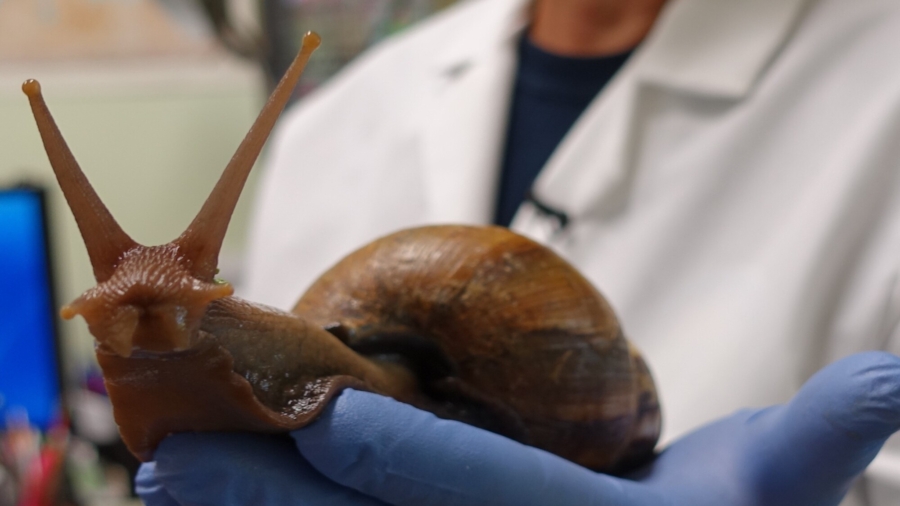A fast-growing invasive snail species believed to be eradicated after it was first discovered in Florida decades ago has been spotted again in the state, prompting a quarantine order and meningitis concerns.
The Florida Department of Agriculture and Consumer Services (FDACS) confirmed in a statement that the giant African land snail was discovered by a gardener on June 23 in the New Port Richey area of Pasco County.
According to FDACS, the invasive species is “one of the most damaging” snails in the world owing to it being able to consume at least 500 different types of plants.
“These snails could be devastating to Florida agriculture and natural areas as they cause extensive damage to tropical and subtropical environments,” FDACS said.
“The snails also pose a serious health risk to humans by carrying the parasite rat lungworm, known to cause meningitis in humans,” it added.
The species has been eradicated twice in Florida in the past after officials discovered it for the first time in 1969, prompting an eradication campaign. The state’s initial campaign ended in 1975 and cost about $1 million.
Another eradication of the pest ended in 2021 after the species was detected for a second time about 10 years ago in Miami-Dade County. Prior to the June 23 detection, the last live giant African land snail in Florida was collected in Miami-Dade County in December 2017.
According to the U.S. Department of Agriculture (USDA), the snails are able to reproduce quickly, producing about 1,200 eggs in a single year.
“After a single mating, each snail can produce 100 to 500 eggs,” the federal agency said on its website. “These snails can reproduce several more times without mating again. They can generate clutches of eggs every 2 to 3 months.”
It is illegal in the United States to own or import giant African land snails without a permit, but some exotic pet owners still keep the invasive species. They have also been illegally imported by individuals for classroom exhibits or for food.

FDACS announced that an eradication campaign launched on June 29 and authorities will use the pesticide metaldehyde to slow the snail’s movement and food digestion.
Metaldehyde is an organic compound that can be used as a pesticide against slugs, snails, and other gastropods. It works by disrupting the mucus production ability of gastropods, reducing digestion and mobility and making them susceptible to dehydration. If a snail has eaten the pesticide, it often seeks a hiding place, becomes inactive, and dies within days.
FDACS has also outlined a quarantine zone in Pasco County on its website, making it unlawful for residents to move the snails or related items, like plants and soil, in or out of the designated quarantine areas.
“It is unlawful to move the giant African land snail or a regulated article, including but not limited to, plants, plants parts, plants in soil, soil, yard waste, debris, compost or building materials, within, through or from a quarantine area without a compliance agreement,” the agency stressed.
The department urged residents who believe they have found the snail species to contact the FDACS hotline, also advising people to avoid touching the snails without gloves because of the meningitis risk.

